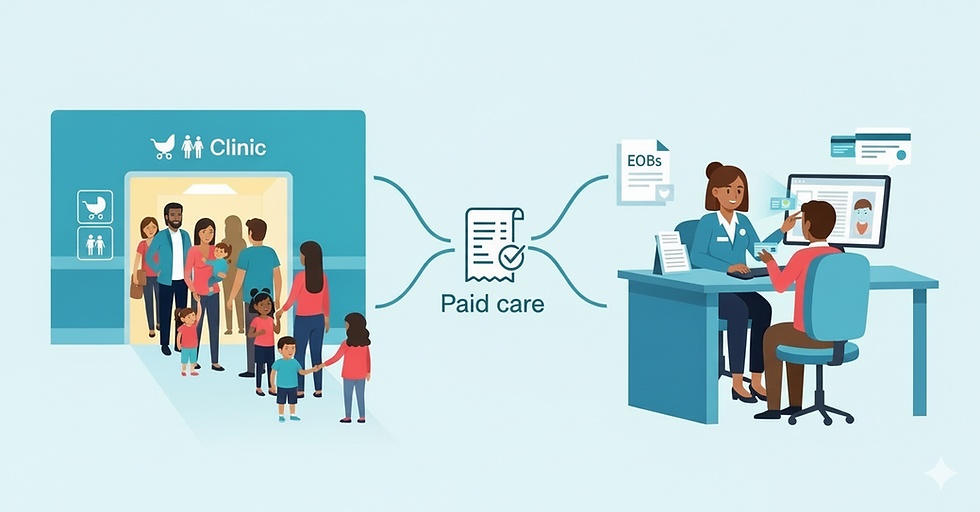Navigating 2025 Mental Health Billing Changes: Key Updates for Providers
- Nicholas Burt, LMFT

- May 20, 2025
- 3 min read
Navigating 2025 Mental Health Billing Changes: Key Updates for Providers

The landscape of mental health billing is evolving rapidly in 2025, with significant changes in regulations, coding, and reimbursement models. Staying informed is crucial for providers aiming to ensure compliance, optimize revenue, and deliver quality care.
1. Mental Health Parity Rule Enforcement Paused
In a notable policy shift, the Trump administration announced it will not enforce the federal mental health parity rule finalized in September 2024. This rule aimed to ensure equitable access to mental health services through private insurance, supporting the 2008 Mental Health Parity and Addiction Equity Act.
The decision follows a lawsuit by the ERISA Industry Committee, representing large employers, challenging the rule’s constraints on offering affordable health benefits. The Departments of Health and Human Services, Treasury, and Labor are reconsidering the regulation, potentially leading to its modification or rescission.
2. CMS Introduces New Billing Codes for Behavioral Health
The Centers for Medicare & Medicaid Services (CMS) have implemented several major changes to Medicare reimbursement policies for behavioral health in 2025:
Safety Planning Interventions: New code G0560 allows billing in 20-minute increments for crisis planning, including cases of suicidal ideation or overdose risk. These services are now reimbursable when provided via telehealth.Source: https://www.adsc.com/blog/behavioral-health-billing-in-2025
Digital Mental Health Tools: Codes 989X1 and 989X2 now cover setup, training, and monthly monitoring of FDA-approved digital mental health interventions.Source: https://www.adsc.com/blog/behavioral-health-billing-in-2025
Network Adequacy Requirements: Medicare Advantage plans must now meet stricter standards for maintaining an adequate network of outpatient behavioral health providers, reducing patient costs and improving access.Source: https://www.adsc.com/blog/behavioral-health-billing-in-2025
3. Updated CPT and ICD-10 Codes Reflect Advances in Behavioral Health
The American Medical Association and CMS have updated CPT and ICD-10-CM codes for 2025 to better reflect behavioral health trends:
Psychotherapy Documentation Requirements: Codes like 90834 and 90837 now include stricter guidance on documenting session length and clinical interventions.Source: https://www.adsc.com/blog/behavioral-health-billing-in-2025
New Codes for Digital Care: 989X1 (initial digital behavioral health intervention setup) and 989X2 (monthly monitoring) are designed to streamline billing for tech-enabled care.Source: https://www.adsc.com/blog/behavioral-health-billing-in-2025
Ultra-Short Sessions: Code 90868 covers sessions under 15 minutes—ideal for quick interventions that previously went unpaid.Source: https://www.adsc.com/blog/behavioral-health-billing-in-2025
Permanent Telehealth Codes: Audio-only services can still be reimbursed under permanent telehealth codes for qualifying patients and scenarios.Source: https://www.adsc.com/blog/behavioral-health-billing-in-2025
4. Emphasis on Measurement-Based Care (MBC)
Measurement-Based Care continues to gain traction in 2025 as insurers push for more outcome-driven treatment models.
Integration with Primary Care: Behavioral health providers are collaborating more closely with primary care doctors to treat the whole patient.Source: https://www.adsc.com/blog/behavioral-health-billing-in-2025
Real-Time Outcome Tracking: Providers are using patient-reported outcome measures (PROMs) to guide treatment decisions and demonstrate clinical progress.Source: https://www.adsc.com/blog/behavioral-health-billing-in-2025
AI and Data Tools: Machine learning and digital dashboards help clinicians predict treatment outcomes and adjust care early.Source: https://www.adsc.com/blog/behavioral-health-billing-in-2025
5. Telehealth Regulations Tighten
While telehealth remains a vital service, CMS is dialing back some pandemic-era flexibilities starting January 1, 2025:
Geographic Restrictions Reinstated: Most telehealth services will again be limited to patients in rural or underserved areas.Source: https://www.cms.gov/files/document/telehealth-faq-calendar-year-2025.pdf
Approved Sites Required: To qualify for reimbursement, providers must deliver services from CMS-approved locations.Source: https://www.cms.gov/files/document/telehealth-faq-calendar-year-2025.pdf
Final Thoughts
As 2025 unfolds, behavioral health providers must stay ahead of coding changes, policy updates, and reimbursement reforms. From parity rules to digital billing codes and telehealth restrictions, the mental health billing environment continues to shift.
Need help navigating these changes? Bridgeway Billing is here to support your program every step of the way.




Comments